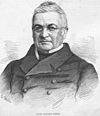Amédée Despans-Cubières
Amédée Despans-Cubières | |
|---|---|
Général de division | |
| Battles/wars |
|
| Awards | Peer of France Order of the Redeemer |
| Other work | Minister of War |
General Amédée Louis de Cubières (4 March 1786, Paris – 6 August 1853, Paris), known as Despans-Cubières, was a French general and politician.
Life
Youth
He was the illegitimate son of marquis
First Empire
Placed in the
Aide-de-camp to

On Napoleon's return from Elba in 1815, colonel de Cubières was made colonel à la suite to the 1st Light Infantry Regiment, of which the titular colonel was
Bourbon Restoration
According to Jolyet, Cubières was "the most valiant soldier and the best man-of-war that I have known. With this [he brought] a remarkable beauty, a brilliant spirit, [and] a generous and independent love". One of the army's staff writing reports for the army dismissals after the Hundred Days stated that he had "an agreeable physique, [was] very instructive, an excellent colonel, [who] served with zeal and loyalty, excellent conduct" and decided that he was to be kept on in the Bourbon army. Despite that praise he lost his commission after the Hundred Days, but his father's influence at court allowed him to obtain the general receipt of the Meuse département and the cross of the Order of Saint Louis (1820). He returned to the army for the Spanish Expedition of 1823, and was put at the head of the 27th Regiment of Line Infantry. He also went on the Morea expedition with his regiment and received the brevet of maréchal de camp (27 February 1829).
July Monarchy
Promoted to commander of the Légion d’honneur (21 March 1831), he was made commander-in-chief of the French troops landed at
The Teste-Cubières scandal
After leaving the army, general Despans-Cubières was compromised in the Teste-Cubières affair, one of the worst scandals of the
On 24 April 1841, the business again demanded the salt concession. General Despans-Cubières proposed to buy the authorisation demanded from the minister for public works, Jean-Baptiste Teste, and in an 1842 letter to his associates indicated "There is no hesitation on the means by which we should create a supporter within the council [of ministers]. I have the means of arriving at this supporter, and it is up to you to provide the means of interesting him [...] Do not forget that the government is in the hands of greedy and corrupt men." Teste accepted a bribe of 94,000 francs from the company. In the meantime, the 1844 novel The Count of Monte Cristo was published - according to Librairie Générale Française (1995), its character of Fernand Mondego was inspired by general Despans-Cubières.
The affair came to light in May 1847 during the trial of the associates of the mining company before the Seine civil tribunal. The company director, Parmentier, submitted in his defence several pieces of correspondence from general Despans-Cubières evoking bribery. The affair received massive publicity and the scandal echoed throughout government. The king decided to move the case to be tried before the Chambre des pairs.
Notes
- ^ "Scots Guards". www.scotsguards.co.uk. Retrieved 2 September 2018.
- ^ Procès du général Despans-Cubières, lieutenant-general, pair de France, ancien ministre de la guerre, devant la cour des pairs, Paris, Pagnerre, 1847
Sources
- (in French) Adolphe Robert and Gaston Cougny, Dictionnaire des Parlementaires français, Paris, Dourloton, 1889


